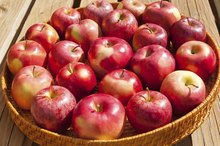What does fact checked mean?
At Healthfully, we strive to deliver objective content that is accurate and up-to-date. Our team periodically reviews articles in order to ensure content quality. The sources cited below consist of evidence from peer-reviewed journals, prominent medical organizations, academic associations, and government data.
- Food and Function: In Vitro and in Vivo Antioxidant Activities of a Flavonoid Isolated from Celery (Apium Graveolens L. Var. Dulce)
- Food and Function: In Vitro and in Vivo Antioxidant Activities of a Flavonoid Isolated from Celery (Apium Graveolens L. Var. Dulce)
The information contained on this site is for informational purposes only, and should not be used as a substitute for the advice of a professional health care provider. Please check with the appropriate physician regarding health questions and concerns. Although we strive to deliver accurate and up-to-date information, no guarantee to that effect is made.
Does Celery Help Cleanse the Body?
While celery does support overall good health, including the health of the organs responsible for ridding your body of toxic substances, it cannot cleanse your body. Your body's liver and kidneys naturally remove harmful substances from your blood and eliminate them in your urine, sweat and stool. But that doesn't mean you shouldn't eat celery. The low-cal crunchy vegetable offers many health benefits.
Why Eat Celery
One medium stalk of celery has just 6 calories, almost 1 gram of fiber and 15 percent of the daily value for vitamin K. It contains small amounts of a number of nutrients you need to stay healthy, including vitamins A, C and E, folate, potassium and manganese.
Celery also contains apiin, an antioxidant that may help scavenge the free radicals in your liver, kidneys, brain and lungs and promote the activity of natural enzymes in your body that also support your fight against the cell-damaging chemicals, according to study published in Food and Function in 2014 2.
Related Articles
References
- KidsHealth: Are Detox Diets Safe?
- Food and Function: In Vitro and in Vivo Antioxidant Activities of a Flavonoid Isolated from Celery (Apium Graveolens L. Var. Dulce)
- Celery, raw. FoodData Central. U.S. Department of Agriculture. Published April 1, 2019.
- Anderson GH, Soeandy CD, Smith CE. White vegetables: Glycemia and satiety. Adv Nutr. 2013;4(3):356S-67S. doi:10.3945/an.112.003509
- Yusni Y, Zufry H, Meutia F, Sucipto KW. The effects of celery leaf (apium graveolens L.) treatment on blood glucose and insulin levels in elderly pre-diabetics. Saudi Med J. 2018;39(2):154-160. doi:10.15537/smj.2018.2.21238
- Eid HM, Nachar A, Thong F, Sweeney G, Haddad PS. The molecular basis of the antidiabetic action of quercetin in cultured skeletal muscle cells and hepatocytes. Phcog Mag 2015;11:74-81 doi: http:10.4103/0973-1296.149708
- Youl, E., Bardy, G., Magous, R., Cros, G., Sejalon, F., Virsolvy, A., Richard, S., Quignard, J., Gross, R., Petit, P., Bataille, D. and Oiry, C., Quercetin potentiates insulin secretion and protects INS‐1 pancreatic β‐cells against oxidative damage via the ERK1/2 pathway. British Journal of Pharmacology, (2010) 161: 799-814. doi:10.1111/j.1476-5381.2010.00910.x
- Tang GY, Meng X, Li Y, Zhao CN, Liu Q, Li HB. Effects of vegetables on cardiovascular diseases and related mechanisms. Nutrients. 2017;9(8). doi:10.3390/nu9080857
- Folate: Fact Sheet for Health Professionals. National Institutes of Health, Office of Dietary Supplements. Updated 2020.
- Vitamin A: Fact Sheets for Health Professionals. National Institutes of Health, Office of Dietary Supplements. Updated 2020.
- Fact or myth: does celery really have negative calories?. Carleton University Dining Services. Updated 2017.
- Allergenic foods and their allergens, with links to informall. University of Nebraska-Lincoln Institute of Agriculture and Natural Resources. Updated 2014.
- Why vitamin K can be dangerous if you take warfarin. Cleveland Clinic. Updated 2019.
- Barone M. Celery juice: Are the benefits real?. UC Davis Health. Updated 2019.
- Combs M H, Ernst M. Celery and celeriac. University of Kentucky College of Agriculture, Food and Environment Cooperative Extension. Updated 2019.
- Celery. University of Nebraska Lincoln Extension.
Writer Bio
Jill Corleone is a registered dietitian and health coach who has been writing and lecturing on diet and health for more than 15 years. Her work has been featured on the Huffington Post, Diabetes Self-Management and in the book "Noninvasive Mechanical Ventilation," edited by John R. Bach, M.D. Corleone holds a Bachelor of Science in nutrition.









